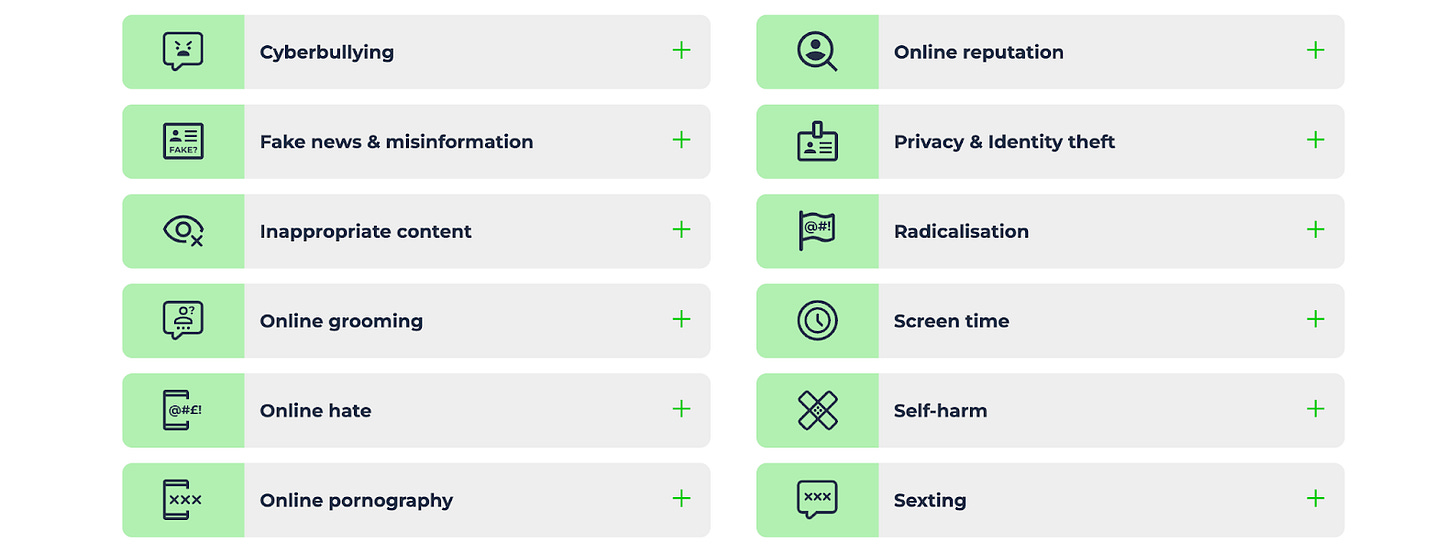Fifth Column
The organisations campaigning to prolong the misery of the smartphone based childhood
“A fifth column is a group of people who undermine a larger group or nation from within, usually in favour of an enemy group or another nation. Clandestine fifth column activities can involve acts of sabotage, disinformation, espionage or terrorism executed within defence lines by secret sympathisers with an external force”
There exists, in the ‘Online Safety space’, a Fifth Column, funded and aided by BigTech companies. They claim to be on the side of parents and children when they are, in fact, engaged in a campaign of obfuscation, misinformation and misdirection. The Molly Rose Foundation is the most egregious example to come to light, following the revelation that it is recieving donations from Meta and Pinterest. After all, these were the two companies found by the coroner to have played a role in the tragic death of Molly. One would imagine that MRF is so thoroughly compromised by this news that all credibility will disappear and it will fade away. Then again, the BBC quoted MRF just days after revealing they are in receipt of funds from Meta, in a story criticising, urr, Meta. Because the media, too, are complicit in this charade.
Mixed messaging such as the above is the modus operandi of Fifth Columnists. But Meta, Pinterest and MFR must have known that news of their collaboration would come out. Did they overplay their hand? Or did they want us to see, to crush our hopes that organisations we know and trust would not be in league with the forces they claim to oppose? The whole thing is so utterly bizarre, it’s hard to know. Which is often a key objective.
Leaving MFR aside, there are many other members of this shady cohort to delve into it (delve…I think a good use of the term, unlike some of the horrendous AI copy one comes across. Delve: “to reach into something or under the surface of something”, Cambridge Dictionary).
Come with me for a quick bit of delving into three Fifth Columnists:
Purporting to “ support children's online safety”, Internet Matters was launched in 2014 by BT, Sky, TalkTalk and Virgin Media and has produced lengthy and deliberately confusing advice since its inception. These include a TikTok guide for teachers to help “recognise the potential safeguarding issues” (TikTok, a company that sends beheading videos to children), a guide for parents to talk to children aged 6-10 about pornography (isn’t 6 a tad young?) and a video from a no doubt well meaning mother who explains that when her son “often looks up sad or scary content” on YouTube she reminds him “you need to be in control of your online viewing” (children, as we know, are famously good at this).
In 2024, Internet Matters finally conceded that “primary school children have no need for a connected device with unrestricted access to apps and games” . Hurrah!! But this is buried on their ‘expert opinion’ page and doesn’t feature in their guidance to parents, which is instead the 12 topics below. Hit the + and receive approximately 6 subheadings. So that’s 72 tabs. All of which lead to more pages of text and more tabs.
Why give simple, clear guidance in 50 words or fewer when you can produce 100,000? There is so much content on Internet Matters and so little help. Sound and fury, signifying nothing, save their contempt for the reader. For a laugh, try out their build your own toolkit. Put in ‘6 year old child’ and select the possible issues they might need help with, from cyberbullying to pornography to posting videos on social media. A helpful toolkit will be with you in moments.
Internet Matters is in partnership with Meta, TikTok, Roblox and Amazon. Thanks, lads! And thank you, Internet Matters.
“Here to make parents feel heard, supported and entertained on every step of their parenting journey”, Netmums no doubt started with good intentions. However, following its purchase in 2011 by Aufeminin (who are in turn owned by Television Francaise, a company involved in “television and film production, publishing, as well as social media services”, things seem to have taken a turn.
Gems published by Netmums include a puff piece on how great Instagram teens is (“part of Instagram’s wider plan to protect young people online”, vom), a story leading with “Banning phones from kids in school does NOT boost grades or mental wellbeing”, which rests on a discredited University of Birmingham Study and, my pick of the shit, a scurrilous headline “Kids with smartphones 'have better mental health than those without”, a complete misrepresentation of a study’s findings.
I don’t know much about Netmums. I know that they run stories showing the harms being caused by smartphones and that they also run stories like the above and offer no clear advice to parents to delay the age that children receive them.
I know who owns them and I can see their editorial stance.
I also can’t help but notice the possible confusion that might result from their reversing of the portmanteau of the genuinely helpful Mumsnet (currently running an excellent ‘Rage Against the Screen’ campaign).
Netmums: bewildering parents appears to be their mission.
This is a big one, in terms of power, reach and uselessness. The IWF is a bad joke: funny in how it repeatedly informs the world how utterly useless it is; bad in that the thing it is useless at is protecting children from the proliferation of child sexual abuse imagery. As they proclaim, as part of their 25th Anniversary, “In 2021, we investigated more reports of suspected child sexual abuse than in the first 15 years of our existence”.
They claim “We exist to stop child sexual abuse online” yet nowhere does the IWF suggest that giving smartphones to children might be a causal factor. However, their annual report 2021 states “We continue to see an exponential increase in what is termed “self-generated” child sexual abuse content, created using webcams or smartphones and then shared online via a growing number of platforms”. This 2024 BBC article, to which the IWF is a major contributor, is headlined “Three-year-olds groomed online, charity warns”. Yet the charity declines the opportunity to recommend to parents not giving their children access to smartphones!
Instead, the IWF’s solution to the crisis of self generated content, sextortion and images of child sexual abuse in general is to take the images down and to promote the Online Safety Act. They have been doing the former since 1996 and the latter for what feels like even longer! The Online Safety Act. The last refuge of those who still deny that giving smartphones to children isn’t a good idea.
The IWF could, and should, continue its work whilst also using its significant profile to advise parents that the best way to stop these images ever appearing is to adopt the precautionary principle with regards to giving their child a smartphone. It is not ‘either, or’. Instead, under the IWF’s watch, we now have 25% of 3-4 year olds owning a smartphone!
IWF supporters includes Meta, Google, Snap, TikTok, Microsoft and Apple. Some, such as Microsoft, have been members for a considerable amount of time (2001 in that case).
The rising share price of these businesses correlates to the proliferation of online child sexual abuse images. But that, of course, is just a correlation.
……..
The IWF will say they do good work. I’m sure that they do. Internet Matters and Netmums do some good stuff also.
But that’s the point, isn’t it? That’s how Fifth Columns work. And there are many at work, including countless in academia.
Over the last 15 years, harms to children have risen and risen. That is the record that these and other groups that claim to support parents and support children are standing on. In some instances, they have helped parents. In nearly every instance, they have also confused them, conspired with the media to produce never ending ‘copy’ and to lead us all down the winding roads to more damage being done to children.
Maybe it’s time to try something different.
Maybe, as part of that, it’s time to start calling out these organisations for what they really are.








Brilliant